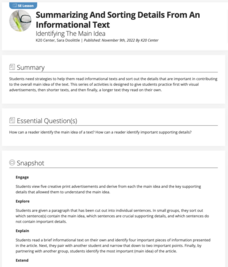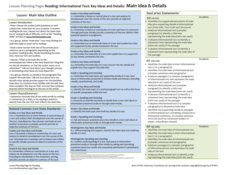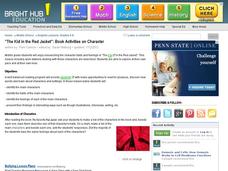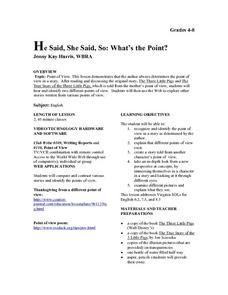K20 LEARN
Summarizing and Sorting Details from an Informational Text: Identifying the Main Idea
Scholars participate in two activities that teach them to identify the main idea and key supporting details in informational text. Partners create a visual that reflects the main idea and key supporting details in an informational text...
For the Teachers
Main Idea Outline
Find the main idea in an informational text with a versatile lesson. Three levels of differentiation help you implement the strategy in any age or class level, based on the ability and objectives of your learners.
Curated OER
Differentiated Language Arts
Pupils read speeches and identify the main idea as well as the literary techniques employed, paying careful attention to the persuasion and repetition elements that each speech possesses. Using a graphic organizer, they analyze,...
Bright Hub Education
"The Kid in the Red Jacket": Book Activities
Learning stations aren't just for little ones; middle schoolers can have fun while learning about the main character in the book, The Kid in the Red Jacket. Outlined are three different activities that are completed as each small group...
Curated OER
Identify Purposes of Text
Set a purpose for reading informational texts with this reading lesson. To find the central idea of a text, young readers turn titles and subtitles into questions to help them understand the text. They complete a T-chart for the lesson,...
Curated OER
Totally Awesome Answers to Wacky Wonders
Middle schoolers work with a partner to gather information on a question from two sources using a computer program and the Internet. They also write a report with visuals to air on closed-circuit TV for the school. Use this lesson to...
Curated OER
The Study of Theme and Figurative Language in Poetry and/or Prose
Identify and analyze the use of figurative language used in select pieces of writing. These pieces of literature will represent at least two pieces by one writer and at least two pieces by different writers. This lesson would be a great...
Curated OER
Rachel's Life is in a Hole
Explore how lack of access to water impacts peoples' lives in poor countries. Through text reading and discussion, middle schoolers are presented with the story of a young girl who lives and functions with limited water resources. They...
Curated OER
The Last Word: Using Critical Thinking and Analysis to Reach a Decision
Want to explore the process of writing a persuasive essay and tie it in with the upcoming elections? Class members use Venn diagrams and the hamburger model of persuasive writing to write a five-paragraph essay on elections and...
Smekens Education Solutions, Inc.
Introducing the 6 Traits to Students
Put together an English language arts unit on the six traits of writing with this helpful collection of resources. From fun songs to differentiated writing exercises reinforcing each of the traits, great ideas are provided for developing...
Curated OER
Pudd'nhead Wilson: Anticipation Guide
Get your pupils thinking about some of the big ideas present in Mark Twain's Pudd'nhead Wilson with this anticipation guide. Learners decided if they believe a series of statements are true or false. A discussion follows.
Curated OER
Showdown on the Frontier
Especially critical following a series of shootings in schools, theaters, and religious buildings, it's safe to say that we need to evaluate the current laws on gun control. Eighth graders read a New York Times article in order to better...
Ontario
Reading Informational Text
Learning to recognize the importance of the features of information text (i.e., titles, subtitles, endnotes, sidebars, etc.) is the focus of a reading activity designed for middle schoolers. Learners examine how these text features help...
Virginia Department of Education
Analyzing and Planning Persuasive Writing
Young writers work backward to analyze persuasive techniques. As a class, work through the provided persuasive letter: a plea to an imaginary city council to lift a city-wide ban on fast food restaurants and discount stores. Start by...
Curated OER
Understanding Cause and Effect
Identify the author's organizational pattern for expressing ideas. After reading an article on the California Gold Rush, middle schoolers determine the author's purpose for writing a passage of informational text. A full list of...
Curated OER
Oliver Twist Goes to Hollywood
How does Oliver Twist, the novel written by Charles Dickens, compare with its screenplay adaptation? Although the activity doesn't require learners to have read the novel, the similarities and differences of the highlighted passages...
Curated OER
He Said, She Said, So: What's the Point?
Not by the hair on my chinny chin chin! Upper graders and middle schoolers read the story The Three Little Pigs and other tales related to the story from various points of view. They use the Internet to find more stories from...
Curated OER
What a Character!
Guide your readers to explore character traits. As a class, discuss and record the traits of a commonly-known fairy tale character. Then do the same with the main character in the class novel. Finally, have learners use magazines and...
Baruch College Writing Center
Summarizing, Paraphrasing, and Quoting Workshop
What's the difference between summarizing and paraphrasing? Show class members how to find the main ideas from informational text and condense it, restate it, or quote it directly with a series of educational activities based on two...
BrainPOP
World History Lesson Plan: Uncovering Essential Questions
Have you ever noticed a news story revolves around an essential question? Scholars research methods of reporting historical events. Working in groups, they use an interactive module to gather information on a historical topic, uncovering...
Curated OER
Cooking in Britain Today
Learners explore British cooking vocabulary. In this ELL vocabulary instructional activity, students identify and describe various foods, match foods with adjectives, discuss their opinions about British cuisine, then read food critic...
Smarter Balanced
How the Brain Works
Cerebrum, cerebellum, brainstem, pituitary gland, and spinal cord. Prepare your class for a performance task assessment on the brain and how it works with a scripted plan that defines these terms and identifies the functions the parts...
Collaborative Learning Project
Simple to Complex Sentences
Such a creative game idea, this activity might actually make grammar fun! Learners play a modified game of connect-four by identifying the grammatical name for different words and phrases and then working them into simple sentences to...
National Math + Science Initative
Reading an Informational Text: "It All Started with Sputnik"
Sputnik was one of the greatest scientific advancements of the 1950s, and this reading lesson does it justice. Pupils start off with pre-reading questions and a video. They then read an excerpt from an article, which is accompanied by...

























